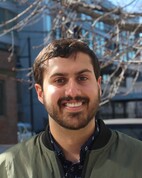Jivan Sobrinho-Wheeler2023 Candidate for Cambridge City Council
|
1. Experience with Cambridge nonprofits. Do you have work or volunteer experience with Cambridge nonprofits?
Yes. Prior to the start of my first term on the Cambridge City Council in 2020, I worked with environmental programs at Cambridge's non-profit Lincoln Institute of Land Policy. In my role there, I helped non-profits, universities, and government organizations find the tools they needed to build sustainable communities. In my term on the Council, I worked with a wide range of non-profits including on issues of homelessness, public safety, and pandemic-response. I've also volunteered with Friendship Works and MAPS to check-in with Portuguese-speaking seniors during the pandemic.
2. Valuing nonprofit expertise. Cambridge nonprofits deliver programs and services across a wide range of missions, from early education and youth development, to affordable housing production and management, arts and culture exposure and education, food security, environmental preservation, civic engagement (or community involvement), and much more. As a result, nonprofit leaders and staff are often well positioned to advise the City on program policies related to their clients and consumers. Will you use your position on the City Council to ensure that the City incorporates the voice and expertise of nonprofit leaders into planning around current City priorities?
Yes. Nonprofit organizations play a critical role in our community by providing critical services that empower residents to have economic stability and a sense of community. They also engage in important public policy advocacy on behalf of the communities they serve. Nonprofit leaders and advocates are a crucial voice for the community. These community relationships are valuable, and often nonprofit organizations have the best understanding of how to meet communities’ needs and how to leverage our public institutions to meet them. Inviting nonprofit leaders into the legislative process strengthens those relationships and provides a clearer pathway for the needs of Cambridge residents to be fully realized in policy.
Streamlining processes to better strengthen the relationship between local government and the nonprofit sector is also crucial in making that relationship productive for the city. In some instances, nonprofits have to engage in redundant bureaucratic processes in order to report finances or apply for public funding. As City Councilor I will use my position to review such processes and streamline them when necessary so that nonprofit organizations are better able to act on their mission in coalition with local government.
Streamlining processes to better strengthen the relationship between local government and the nonprofit sector is also crucial in making that relationship productive for the city. In some instances, nonprofits have to engage in redundant bureaucratic processes in order to report finances or apply for public funding. As City Councilor I will use my position to review such processes and streamline them when necessary so that nonprofit organizations are better able to act on their mission in coalition with local government.
3. Limiting application of Anti-Aid Amendment. With the exception of contracts for services, the Anti-Aid Amendment of the MA Constitution prohibits municipalities from directly distributing funds raised through taxation to nonprofits. While the City provides financial support to nonprofits through contracting, this approach increased administrative burdens, can cause cash-flow issues due to payment delays, and limits creativity in developing new funding opportunities. It also can create an incentive for the City to start new initiatives rather than invest in programs already well established in the community. Will you use your position on the City Council to limit the application of the Anti-Aid Amendment to tax generated revenue only, in order to maximize the resources available to Cambridge nonprofits?
Yes. The Anti-Aid amendment is too often applied overly broadly and ends up rejecting important and creative ways to assist the lives of residents who need it and strengthen our communities.
4. Attending to nonprofit workforce challenges. According to CNC's December 2022 survey of Cambridge nonprofits, (70%) reported open positions and over a third (36%) said they lacked the funding to fill them, comprising their ability to meet service demands. Do you believe the City Council can play a role in helping nonprofits recruit and retain high quality staff?
Yes. On the local level, City Council can provide funds to organizations (through ARPA funds and broadening partnerships) to help them be more adequately funded. I also believe the City can provide more technical and human resources support to help with recruiting and retaining high quality staff in our nonprofit community.
5. ARPA investments in nonprofits. While Cambridge nonprofits are grateful for the City committing millions of ARPA dollars to local organizations, concerns have been raised both about the slow pace of releasing funds into the community and a lack of information being shared broadly regarding their progress. Will you use your position on the City Council to expedite this process and ensure there is greater transparency going forward?
Yes. Nonprofit organizations have played a key role in making Cambridge a safer, more equitable city for all, and the vast systemic inequalities revealed by COVID make clearer the need for a strong, robust nonprofit sector. As a City Councilor, I will work to ensure that ARPA funding is released in a timely and transparent manner to benefit all our Cambridge residents.

